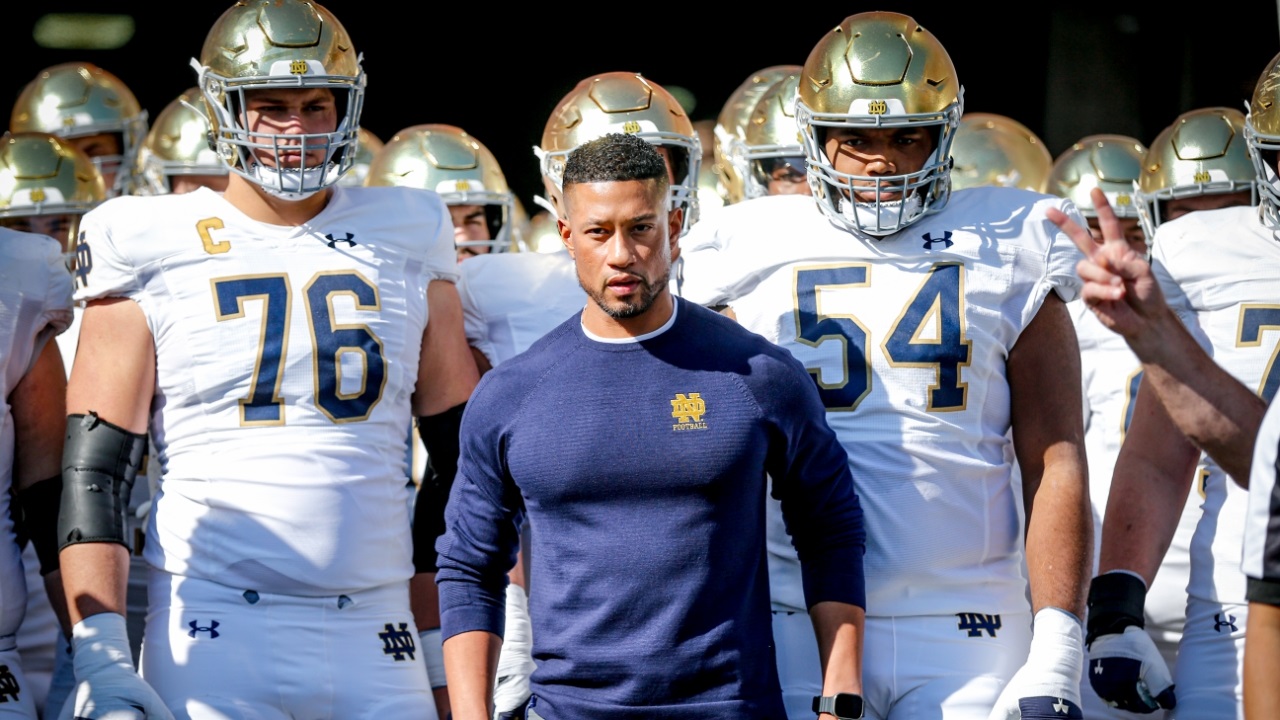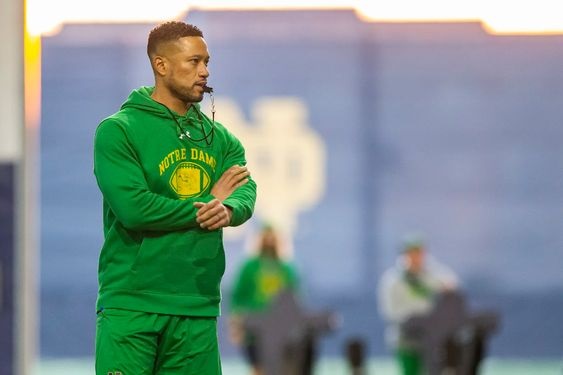HIGHLIGHT: Notre Dame has learned from past mistakes, avoiding the kind of long-term contract that famously burdened the program…
Notre Dame Football: Evaluating Marcus Freeman’s 2024 Season After NIU Setback
Notre Dame’s 2024 football season has been a rollercoaster, featuring a dominant opener against Texas A&M and a blowout victory over Purdue, only to be marred by an embarrassing loss to Northern Illinois. This latest setback has prompted comparisons to the tenure of Charlie Weis, whose tenure at Notre Dame was defined by losses like those against Syracuse in 2008, Navy in 2007 and 2009, and UConn in 2009. With Marcus Freeman’s recent stumble, fans are asking: is this a sign of deeper issues within the coaching staff, or simply growing pains for a third-year head coach?
While Freeman’s early losses to Marshall, Stanford, and now NIU echo some of the dismal defeats from the Weis era, there’s reason to believe his situation differs. Freeman’s teams have demonstrated resilience in ways that Weis’ squads did not. Moreover, Notre Dame has learned from past mistakes, avoiding the kind of long-term contract that famously burdened the program under Weis. After only seven games in his first season, Weis was signed to a 10-year deal, a decision that cost Notre Dame nearly $19 million in buyouts after his dismissal.
Fan Reactions and Criticism: Where Should the Blame Lie?
Notre Dame’s passionate fan base has not been shy in voicing its frustrations. Calls to fire Freeman or bench players have become common, but it’s important to distinguish between how the University views student-athletes and its coaching staff. As former University president Fr. Jenkins pointed out in a 2021 interview with The New York Times, student-athletes are not employees, and they should not be judged as such. These students contribute to the University on and off the field, and their scholarships are not tied to their athletic performance or injury status.
Coaches, on the other hand, are well-compensated professionals whose job security is directly tied to their results. According to Notre Dame’s 2023 Form 990, Marcus Freeman is the University’s highest-paid employee, earning $6.6 million annually—double that of any other staff member. With such high stakes, expectations for consistency and success on the field are warranted.
Avoiding the Charlie Weis Trap: Lengthy Contracts, High Risks
The cautionary tale of Charlie Weis continues to loom large over Notre Dame football. While some fans are eager for a swift decision, the University has wisely refrained from locking Freeman into a long-term deal too early in his tenure. Reports suggest that Freeman’s contract lasts five or six years, while offensive coordinator Mike Denbrock and defensive coordinator Al Golden received longer four-year deals. Denbrock’s record-setting contract made him the highest-paid offensive coordinator in the country, but the team’s offensive performance has left much to be desired. Notre Dame ranks 112th in passing efficiency, and after three games, the starting quarterback has yet to throw a touchdown pass.
This raises a crucial point: lengthy, lucrative contracts can hamstring a program. High-priced, underperforming coaches make it difficult to course-correct when necessary, a lesson Notre Dame learned the hard way with Weis. In a sport where performance must come first, the University would do well to continue exercising caution before committing to any long-term deals with its coaching staff.
The Path Forward: Freeman’s Redemption and Future Expectations
Notre Dame has several upcoming matchups that offer a chance for Freeman and his coaching staff to prove themselves. Games against Miami (Ohio), Navy, and Army provide opportunities to demonstrate that the team won’t continue playing down to the level of competition. If Freeman can steer the team back into playoff contention, the program’s leadership will have to decide how to reward that success—without repeating the mistakes of the past.
Even if Freeman leads Notre Dame to the playoffs, the University should be careful before offering another decade-long contract. While good coaches deserve fair compensation, extending contracts prematurely can expose the program to unnecessary risks. The rapidly escalating coaching salaries in college football should face greater scrutiny, not less, and shorter contracts may foster a sense of urgency that drives better performance.
As Freeman strives to guide Notre Dame to playoff success, the University’s leadership must remain vigilant. Celebrate the wins, but remember the lessons learned from the Charlie Weis era: consistency should be the foundation for any long-term commitment.
In the end, coaches—much like the student-athletes they lead—may thrive best when faced with the pressure to perform, knowing their time to make a difference is finite.


